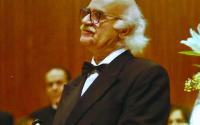Published on Tuesday, September 7, 2004 by the Boston GlobeJames Carroll
GEORGE W. BUSH finally told the truth. It happened last week when he said of the war on terrorism, "I don't think you can win it."
We know it was the truth because of the way it embarrassed him, because of the way his handlers immediately required him to repudiate it ("I probably need to be more articulate"), and because the mass of Republicans were deaf to it. Just as Bush had inadvertently spoken the exact truth about the war on terrorism at its onset ("This crusade, this war on terrorism"), he had inadvertently done so again.
Six months ago, I took a leave from this column. I had been writing obsessively about the war for more than two years, and my truth had become woefully repetitive. "Whatever happens from this week forward in Iraq," I wrote in March, "the main outcome of the war is clear. We have defeated ourselves."
In the time since I wrote that, I confess, even my bleak vision has come to seem like the good old days. After all, that was before Abu Ghraib, before the siege of Najaf, before the Sunnis and Shi'ites discovered that their hatred of the occupiers outweighed their hatred of each other, before the handover of Fallujah to outlaw militants, before Ahmed Chalabi's disgrace (and last week's rehabilitation), before Washington's installation in Baghdad of a blatant puppet regime, before the death toll of young Americans approached 1,000.
Citizens of the United States are a decent, fair-minded people. The only reason we tolerate what is being done in our name in Iraq is that, for us, this war exists only in the realm of metaphor. The words "war on terrorism" fall on our ears much in the way that "war on poverty" or "war on drugs" did.
War is an abstraction in the American imagination. It lives there, cloaked in glory, as an emblem of patriotism. We show our love for our country by sending our troops abroad and then "supporting" them, no matter what. When images appear that contradict the high-flown rhetoric of war -- whether of young GIs disgracefully humiliating Iraqi prisoners or of a devastated holy city where vast fields of American-created rubble surround a shrine -- we simply do not take them in as real. Thinking of ourselves as only motivated by good intentions, we cannot fathom the possibility that we have demonized an innocent people, that what we are doing is murder on a vast scale.
There is the single most troubling aspect of the war in Iraq. We launched it against the wicked Saddam Hussein, yet the majority of so-called "insurgents" against whom our forces are arrayed hated Hussein more than we did. We are killing people by the thousands who threaten absolutely nothing of ours.
The boys in the Iraqi resistance are not terrorists. They are not Ba'athists. They are not jihadists -- or they weren't until we gave them reason to be. Whatever the justifications for the invasion of Iraq were a year and a half ago, why are we in this war today? And as President Bush might ask, how in the world do we "win" it?
Obviously, something else is going on below the surface of all the stated reasons for this war. The Republican convention last week was gripped with war fever, and the fever itself was the revelation. War is answering an American need that has nothing to do with the Iraqi people.
Even though the war on terrorism is indeed, as the president said, a "crusade," it has nothing real to do with Islam either, although Islam is surely its target. Not Islam as it actually exists in dozens of different settings and cultures across the globe, but an imagined Islam that exists only in the troubled minds of a people who project "evil" outward and then attack it. Alas, it is an old Christian habit.
The war, meanwhile, answers the Bush administration's need to justify an unprecedented repressiveness in the "homeland," and simultaneously prompts widespread docile submission to the new martial law. But more deeply still, by understanding ourselves as a people at war, we Americans find exemption from the duty to face the grotesque shame of what we are doing in the world.
So the final truth about this war is that there is no real enemy (although we are creating enemies by the legion). There will be no victory. I resume this regular column by declaring, President Bush was right.
James Carroll's columns against the Iraq war have just been published in the book, "Crusade: Chronicles of an Unjust War."






